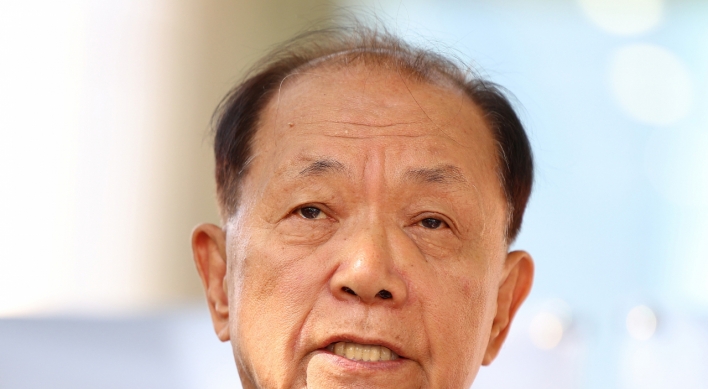[Editorial] Google’s Hangeul pitch
Collaboration can benefit both sides
By Yu Kun-haPublished : Oct. 31, 2013 - 19:32
It is encouraging that Google executive chairman Eric Schmidt has come forward to support the propagation of Korea’s culture and arts, especially its unique writing system, “Hangeul.”
Google has concluded an agreement with the Ministry of Culture, Sports and Tourism to promote the Korean alphabet, which Schmidt praised as the world’s most intuitive writing system.
Worth noting is Google’s plan to assist Korea in developing software to help foreigners learn the basic principles of the Korean alphabet through the Internet. Such a program can tap into the growing interest in Hangeul and the Korean language among foreigners amid the global Korean pop culture boom.
As Schmidt noted, if only 1 percent of the more than 1 billion people who watched Psy’s “Gangnam Style” music video on YouTube learned Hangeul, there would be more than 10 million new users of the Korean alphabet. A program tailored to these people would go a long way toward making Hangeul an international writing system.
Here one may wonder what has prompted the Google top executive to support the use of the Korean alphabet. Schmidt traces Korea’s success in the digital world to the creation of Hangeul, as the simplified, easy-to-learn alphabet facilitates information exchanges among people.
Schmidt is particularly impressed by the fact that King Sejong invented the writing system about 600 years ago to help ordinary people communicate better. At the time, learned people could exchange information through the Chinese script, but ordinary people had no way to express themselves in writing.
Schmidt says the motivation behind the king’s creation of Hangeul is in line with Google’s mission: to organize the world’s information and make it universally accessible and useful.
Under the deal with the Korean government, Google will also showcase Korea’s cultural heritage online. Specifically, the Google Cultural Institute, an online archive of historic resources, will feature Korean films, “hanbok” (the Korean traditional dress) and “hanok” (Korean traditional houses).
The Google Art Project, an online platform that allows the public to access images of artwork in the custody of museums around the world, will also display Korea’s modern and contemporary paintings.
All these projects will benefit Google by enriching its vast archives. But at the same time, they will also benefit Korea, as did the K-pop channel Google established on YouTube under a 2011 agreement.
There will be more areas where Korea and the Internet giant can benefit through collaboration. The government needs to look for ways to expand cooperation in software development.
Google has concluded an agreement with the Ministry of Culture, Sports and Tourism to promote the Korean alphabet, which Schmidt praised as the world’s most intuitive writing system.
Worth noting is Google’s plan to assist Korea in developing software to help foreigners learn the basic principles of the Korean alphabet through the Internet. Such a program can tap into the growing interest in Hangeul and the Korean language among foreigners amid the global Korean pop culture boom.
As Schmidt noted, if only 1 percent of the more than 1 billion people who watched Psy’s “Gangnam Style” music video on YouTube learned Hangeul, there would be more than 10 million new users of the Korean alphabet. A program tailored to these people would go a long way toward making Hangeul an international writing system.
Here one may wonder what has prompted the Google top executive to support the use of the Korean alphabet. Schmidt traces Korea’s success in the digital world to the creation of Hangeul, as the simplified, easy-to-learn alphabet facilitates information exchanges among people.
Schmidt is particularly impressed by the fact that King Sejong invented the writing system about 600 years ago to help ordinary people communicate better. At the time, learned people could exchange information through the Chinese script, but ordinary people had no way to express themselves in writing.
Schmidt says the motivation behind the king’s creation of Hangeul is in line with Google’s mission: to organize the world’s information and make it universally accessible and useful.
Under the deal with the Korean government, Google will also showcase Korea’s cultural heritage online. Specifically, the Google Cultural Institute, an online archive of historic resources, will feature Korean films, “hanbok” (the Korean traditional dress) and “hanok” (Korean traditional houses).
The Google Art Project, an online platform that allows the public to access images of artwork in the custody of museums around the world, will also display Korea’s modern and contemporary paintings.
All these projects will benefit Google by enriching its vast archives. But at the same time, they will also benefit Korea, as did the K-pop channel Google established on YouTube under a 2011 agreement.
There will be more areas where Korea and the Internet giant can benefit through collaboration. The government needs to look for ways to expand cooperation in software development.






![[KH Explains] No more 'Michael' at Kakao Games](http://res.heraldm.com/phpwas/restmb_idxmake.php?idx=644&simg=/content/image/2024/04/28/20240428050183_0.jpg&u=20240428180321)










![[Herald Interview] Mistakes turn into blessings in street performance, director says](http://res.heraldm.com/phpwas/restmb_idxmake.php?idx=652&simg=/content/image/2024/04/28/20240428050150_0.jpg&u=20240428174656)
